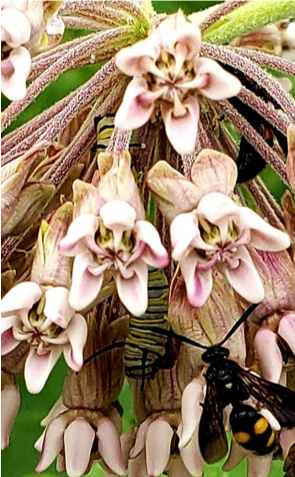Beneficial Insects
go.ncsu.edu/readext?690754
en Español / em Português
El inglés es el idioma de control de esta página. En la medida en que haya algún conflicto entre la traducción al inglés y la traducción, el inglés prevalece.
Al hacer clic en el enlace de traducción se activa un servicio de traducción gratuito para convertir la página al español. Al igual que con cualquier traducción por Internet, la conversión no es sensible al contexto y puede que no traduzca el texto en su significado original. NC State Extension no garantiza la exactitud del texto traducido. Por favor, tenga en cuenta que algunas aplicaciones y/o servicios pueden no funcionar como se espera cuando se traducen.
Português
Inglês é o idioma de controle desta página. Na medida que haja algum conflito entre o texto original em Inglês e a tradução, o Inglês prevalece.
Ao clicar no link de tradução, um serviço gratuito de tradução será ativado para converter a página para o Português. Como em qualquer tradução pela internet, a conversão não é sensivel ao contexto e pode não ocorrer a tradução para o significado orginal. O serviço de Extensão da Carolina do Norte (NC State Extension) não garante a exatidão do texto traduzido. Por favor, observe que algumas funções ou serviços podem não funcionar como esperado após a tradução.
English
English is the controlling language of this page. To the extent there is any conflict between the English text and the translation, English controls.
Clicking on the translation link activates a free translation service to convert the page to Spanish. As with any Internet translation, the conversion is not context-sensitive and may not translate the text to its original meaning. NC State Extension does not guarantee the accuracy of the translated text. Please note that some applications and/or services may not function as expected when translated.
Collapse ▲Spoiler Alert: Not Every Insect is the Enemy (Beneficial Insects Provide Benefits)
Recently, some news media are reporting – with the sensational headline of “Murder Hornet” – that the Asian giant hornet (Vespa mandarinia) has been found in Washington state. While our office has been contacted by folks who are very concerned, some even frightened about this insect, there are a couple of pieces of information that are important to keep in mind according to David R. Tarpy, NC State University Professor and Extension Apiculturist:
- these hornets are not in North Carolina
- they are often mistaken with European hornets, but other flying and stinging insects as well
- overall they pose a very minor risk to human and bee health
For accurate information, please take a look at Asian Giant Hornets and European Hornets, as well as the blog with some excellent photographs by Dr. Matt Bertone, Director and diagnostic entomologist with the NCSU Plant Disease and Insect Clinic.
There are factual reasons to be concerned about insects, but not because of the FEAR (False Expectations Appearing Real) model of sensational headlines. The world has lost more than one quarter of its land-dwelling insects in the past 30 years, according to Dr. Roel van Klink whose research focuses on long-term changes in insect communities and has found a link between insect losses and creeping urbanization, which absorbs land where insects live and eat, and general loss of habitat from removing weeds and flowers “bugs” need.
Insects are valuable parts of our ecosystem. According to Professor Dave Goulson at Sussex University “It should be of huge concern to all of us, for insects are at the heart of every food web, they pollinate the large majority of plant species, keep the soil healthy, recycle nutrients, control pests and much more.” “Love them or loathe them, we humans cannot survive without insects.”
I’m not advocating anyone go high-five a hornet, unless you’re at the Spectrum Center Arena on E. Trade Street in Charlotte, NC and get the chance to show the team some support. But let’s consider that not all insects and other tiny residents in the garden and landscape are our foes. Some are friends that you want to attract, maintain or at least leave alone, so they can do their thing – helping to control the pesky pests. Conservation of beneficials is an important aspect of pest control as part of Integrated Pest Management (IPM) practices, and it’s just kind of cool to have your own personal army.
maintain or at least leave alone, so they can do their thing – helping to control the pesky pests. Conservation of beneficials is an important aspect of pest control as part of Integrated Pest Management (IPM) practices, and it’s just kind of cool to have your own personal army.
Beneficial insects come in an assortment of shapes, sizes and functions. With function as the guideline, beneficials can be divided into four basic types: predators, parasitoids, decomposers/recyclers and pollinators. For more detail on these roles and who plays them, take a look at Beneficial Insects.
Remember to “Know before you grow”, learn who your friends are, and plant wisely to provide a happy home for your helpers. Read more about it in the Extension Gardener Handbook and check out some of Debbie Roo’s amazing photographs for helping identify the good guys at Growing Small Farms Beneficials.
Minda Daughtry is the Horticulture Agent for North Carolina Cooperative Extension in Lee County.




